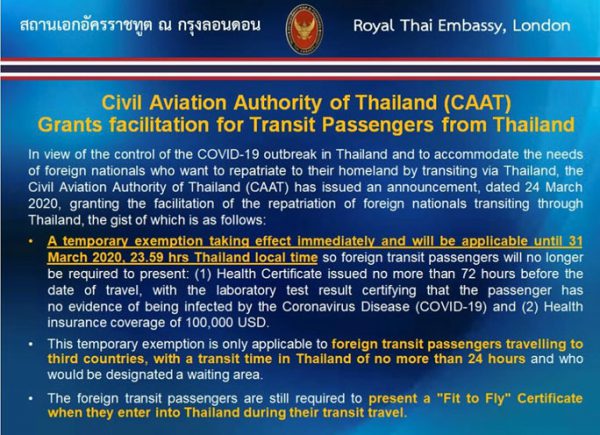BANGKOK 26 March 2020: European tourists are stranded in Cambodia’s capital, Phnom Penh, unable to fly to Bangkok to connect with flights home due Thailand’s strict rule that requires all travellers to present a medical certificate and proof of insurance cover valued at USD100,000.
The BBC interviewed UK travellers Tuesday evening, who were about to miss their flights to Bangkok where they were due to connect with flights on Thai Airways International to London. They were still in Phnom Penh seeking clarity on how to obtain medical certificates that met Thailand’s stringent conditions.
The Civil Aviation Authority of Thailand requires all travellers to Thailand, including those who are just transiting at an airport to connect with flights to third countries, to have a medical certificate that declares them free of Covid-19 with a supporting lab test. In Phnom Penh, the documents are difficult if not impossible to obtain.

Claiming they were ignored by Thai Airways and the British embassy in Phnom Penh the UK nationals told the BBC they were now desperate fearing they would not be able to extend their stay in hotels that are keen to close operations. They were fast running short of cash and angry with the airline and their embassy.
Stressed and almost in tears, this was not how they thought their holiday in Southeast Asia would end. They were supposed to fly from Phnom Penh with a short transit stop in Suvarnabhumi Airport in Bangkok to connect with THAI’s late-night flight to London.
While their efforts to call the airline failed late Tuesday, Thailand’s embassy in the UK did issue a statement on its Facebook page detailing what it called a “CAAT temporary exemption for transit passengers valid up to 2359 on 31 March”.
It stated that foreign transit passengers would no longer need to present a health certificate with a lab test and the compulsory insurance cover if they were transiting in Thailand to join a flight to a third country.
The CAAT temporary exemption is valid for travellers transiting in Thailand for not more than 24 hours. They will be assigned to a special zone of the transit hall isolated from other passengers.
However, to add an element of confusion, CAAT said they would still need to show “ a fit-to-fly certificate” when they enter Thailand during their “transit travel.”
It appears to be par for the course that any announcement made by Thai government agencies concerning the Covid-19 crisis is cloaked in ambiguity and often raises more questions than answers.
CAAT’s latest exemption begs one question; just what is the “fit-to-fly certificate? The agency should have explained the difference between the medical certificate that is temporarily suspended for transit passengers and the “fit-to-fly” certificate that apparently remains a requirement for transit passengers?
(In truth, the “fit-to-fly” certificate is a requirement for Thais returning home and is issued by a Thai embassy and presented to airlines when boarding. It is not relevant to foreign transit travellers. )
THAI and other airlines that face this ambiguity need to provide clarity on the CAAT exemption, which is not evident on the agency’s website. Time is running out with the 31 March fast approaching.
European travellers face the prospect of being stranded in a Mekong Region country unable to reach the Bangkok gateway airport to connect with flights home for no fault of their own.
Neighbouring countries are not up to speed on delivering the medical certificate with the lab test as demanded by Thailand and the CAAT ruling needs further clarification.






